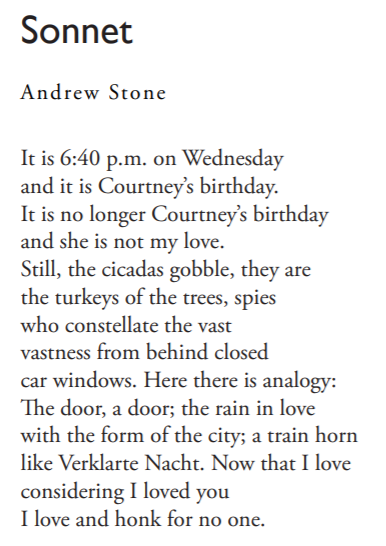The Close Reading Series invites our board editors to write about a favorite piece from our Spring 2020 issue. These readings are not intended to be definitive interpretations; when we read, we bring with us our own histories, experiences, and references, all of which guide our relationship to the work before us. It is possible, even probable, that the meanings our editors found in these pieces will be different from your own, and perhaps even different from the authors’ intentions. We hope that these close readings will demonstrate what we loved about these pieces, and encourage you to find things to love about them as well.
This week, Editor-in-Chief Morgan Levine discusses “Sonnet.”

Andrew Stone’s “Sonnet” has come back to me many times since I first read it in January, often while driving, always in the time after sunset when some light remains and the sky is big and denim-colored. There’s something so aching but self-aware about it. To be a sonnet and to name yourself a sonnet, sentimentality and the obviousness of analogy, that’s all here. But there’s also a distinct clarity, which the shortness of the form assists: this is a very specific poem, about a very specific moment — “6:40pm on Wednesday.”
“Sonnet” is sonically very busy: the sound of rain, the “train horn / like Verklarte Nacht,” the cicadas. It reminds me of Pitchfork’s review of Playboi Carti’s Die Lit: “This is music that fundamentally recalibrates the brain’s reward centers.” However, it also reminds me of the Smog song “Our Anniversary,” slower, older, and humming with the histories of a relationship. Stone twists the thread between sound and meaning: the gobbling cicadas, or “the turkeys of the trees,” is a brilliantly disconcerting description, and I felt it dial a familiar noise into a new shape. Cicadas are ironic witnesses to the past love, “spies / who constellate the vast” — but the poem sees where it’s headed and sighs at itself — “vastness.” The vast vastness, the way a sonnet can unfold a moment and refold it with all of its edges revealed.
I think this poem is very intentional in how it dilates meaning. “The door, a door” in particular stopped me, as I watched an object in the poem move from the symbolic to everyday. The rain is romantic, but loves the form of the city rather than the city itself. The ending is a maze I love to trace: the speaker of the poem feels the specialness of this moment out-of-love, a specialness that comes from the moments in-love, and in that moment is enacting love. And so we have another love sonnet, performing itself just slightly off-key. And I love and honk for that.
Read more of our Spring Issue here.

